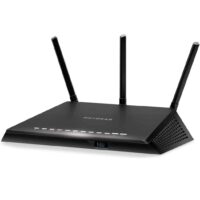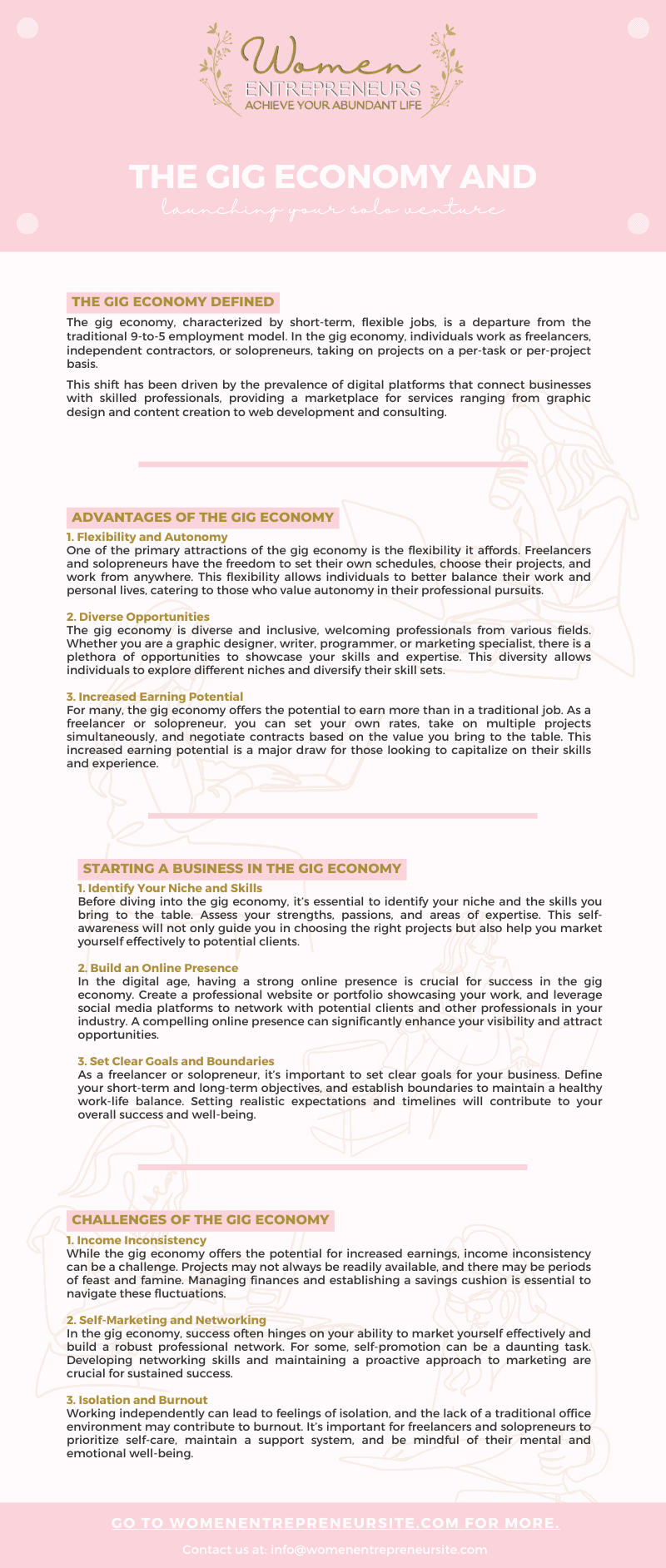In the realm of professional growth, there comes a pivotal moment for many individuals when the…
The Gig Economy and Launching Your Solo Venture

The landscape of work has undergone a transformative shift in recent years, ushering in the era of the gig economy. With the rise of digital platforms and the increasing desire for flexibility, many individuals are opting to embark on solo ventures as freelancers or solopreneurs.
This paradigm shift in the way people approach work has opened up new opportunities for those seeking independence and autonomy in their professional lives. In this article, we will explore the gig economy, delve into the nuances of starting a business as a freelancer or solopreneur, and discuss the challenges and rewards of this evolving work model.
The Gig Economy Defined
The gig economy, characterized by short-term, flexible jobs, is a departure from the traditional 9-to-5 employment model. In the gig economy, individuals work as freelancers, independent contractors, or solopreneurs, taking on projects on a per-task or per-project basis. This shift has been driven by the prevalence of digital platforms that connect businesses with skilled professionals, providing a marketplace for services ranging from graphic design and content creation to web development and consulting.
>> Buy your own Wifi now! Manage your Social Media anytime, anywhere:
Advantages of the Gig Economy
1. Flexibility and Autonomy
One of the primary attractions of the gig economy is the flexibility it affords. Freelancers and solopreneurs have the freedom to set their own schedules, choose their projects, and work from anywhere. This flexibility allows individuals to better balance their work and personal lives, catering to those who value autonomy in their professional pursuits.
2. Diverse Opportunities
The gig economy is diverse and inclusive, welcoming professionals from various fields. Whether you are a graphic designer, writer, programmer, or marketing specialist, there is a plethora of opportunities to showcase your skills and expertise. This diversity allows individuals to explore different niches and diversify their skill sets.
3. Increased Earning Potential
For many, the gig economy offers the potential to earn more than in a traditional job. As a freelancer or solopreneur, you can set your own rates, take on multiple projects simultaneously, and negotiate contracts based on the value you bring to the table. This increased earning potential is a major draw for those looking to capitalize on their skills and experience.
She Means Business
Are you prepared to launch your business concept? Time to take action! By using a computer and an internet connection, you can share your ideas and communicate your message, as well as advertise your business in ways that were previously impossible.
Starting a Business in the Gig Economy
1. Identify Your Niche and Skills
Before diving into the gig economy, it’s essential to identify your niche and the skills you bring to the table. Assess your strengths, passions, and areas of expertise. This self-awareness will not only guide you in choosing the right projects but also help you market yourself effectively to potential clients.
2. Build an Online Presence
In the digital age, having a strong online presence is crucial for success in the gig economy. Create a professional website or portfolio showcasing your work, and leverage social media platforms to network with potential clients and other professionals in your industry. A compelling online presence can significantly enhance your visibility and attract opportunities.
3. Set Clear Goals and Boundaries
As a freelancer or solopreneur, it’s important to set clear goals for your business. Define your short-term and long-term objectives, and establish boundaries to maintain a healthy work-life balance. Setting realistic expectations and timelines will contribute to your overall success and well-being.
Inspiration and Advice from over 100 Entrepreneurs
More than 100 extraordinary and influential women are profiled in this book, sharing their creative spirits, overcoming adversity, and sparking a global entrepreneurship movement. This collection of profiles illustrates what can happen when we follow our passions and dreams. The list includes media titans, ceramicists, hoteliers, tattoo artists, comedians, and architects.
Challenges of the Gig Economy
1. Income Inconsistency
While the gig economy offers the potential for increased earnings, income inconsistency can be a challenge. Projects may not always be readily available, and there may be periods of feast and famine. Managing finances and establishing a savings cushion is essential to navigate these fluctuations.
2. Self-Marketing and Networking
In the gig economy, success often hinges on your ability to market yourself effectively and build a robust professional network. For some, self-promotion can be a daunting task. Developing networking skills and maintaining a proactive approach to marketing are crucial for sustained success.
3. Isolation and Burnout
Working independently can lead to feelings of isolation, and the lack of a traditional office environment may contribute to burnout. It’s important for freelancers and solopreneurs to prioritize self-care, maintain a support system, and be mindful of their mental and emotional well-being.
7 Steps to Becoming a Network Marketing Professional
More than two decades ago, Eric Worre experienced a transformative moment during a corporate event, which led him to commit to becoming an accomplished professional in network marketing. Since then, he has concentrated on acquiring the necessary skills to succeed, positively influencing numerous individuals worldwide.
Final Thoughts
The gig economy represents a seismic shift in the way people approach work, offering unprecedented opportunities for independence and entrepreneurship. As a freelancer or solopreneur, individuals can harness their skills, set their own paths, and create a fulfilling and flexible career. However, this newfound freedom comes with its own set of challenges, from income inconsistency to the need for effective self-marketing.
By understanding the dynamics of the gig economy, identifying personal strengths, and adopting a strategic approach to business, freelancers and solopreneurs can navigate the complexities of this evolving landscape. With the right mindset, skills, and a commitment to continuous learning, individuals can thrive in the gig economy, enjoying the rewards of autonomy, diversity, and increased earning potential in their professional pursuits.










